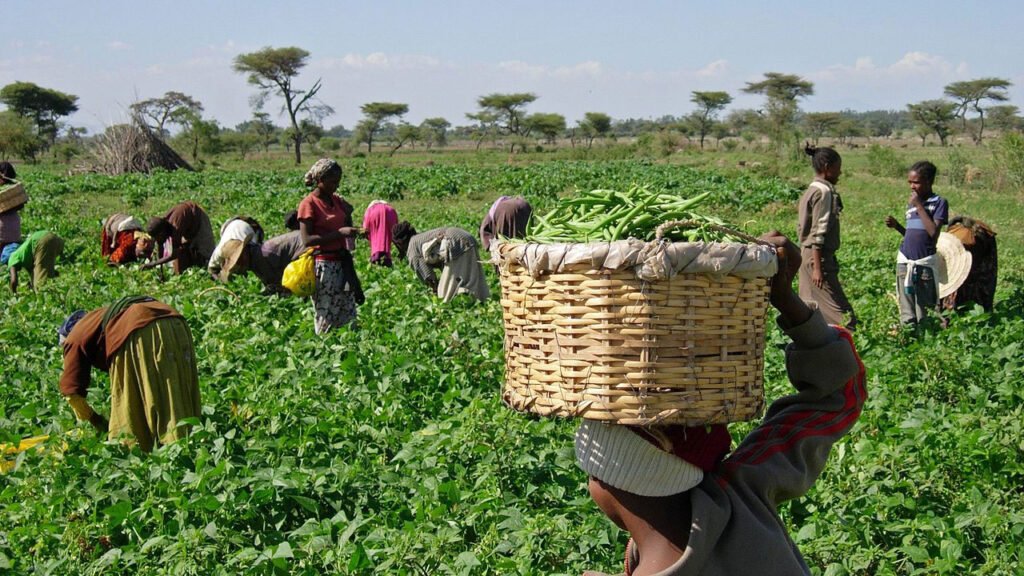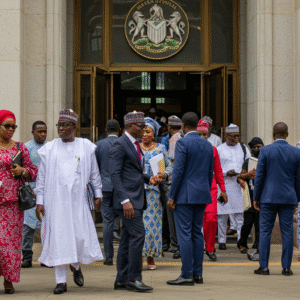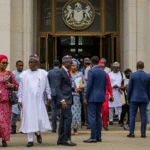The Paradox of a Giant
Nigeria stands as a fascinating and often contradictory economic powerhouse. On the one hand, it’s widely hailed as Africa’s largest economy, a giant with immense potential driven by its vast population and rich natural resources. But on the other hand, for a majority of its citizens, this title feels like a cruel joke. The reality on the ground for millions is a daily struggle with extreme poverty. As of 2025, over 60% of the population, according to data from the National Bureau of Statistics, still lives in conditions of poverty, a stunning paradox that demands a closer look.
Beyond the official statistics and the grand pronouncements, there are deeper, more uncomfortable truths about the Nigerian economy. These are the facts that aren’t discussed at press conferences or in celebratory speeches. This article is your key to unlocking those hidden truths. We’ll peel back the layers and expose 10 shocking realities of Nigeria’s economic landscape in 2025—facts that are absolutely essential for every Nigerian to understand.
Whether you’re an entrepreneur trying to navigate the volatile market, a student trying to plan for your future, a policymaker seeking genuine reform, or simply a concerned citizen, the insights we’re about to share will fundamentally alter your perspective. They’ll show you why a nation so rich in resources continues to face such daunting challenges and, more importantly, what it will take to build a future where economic success isn’t just a headline but a tangible reality for every single person.
This video provides an expert analysis of the drivers behind Nigeria’s GDP growth, offering a deeper dive into the topics we’ll be discussing.
1. Nigeria Earns Over 80% of Its Revenue from Oil
It’s an irony as old as the discovery of oil in Nigeria: a nation so vast and diverse in potential, yet perpetually chained to the fortunes of a single commodity. In 2025, crude oil exports continue to dominate, accounting for a staggering portion of the government’s revenue and foreign exchange earnings. This isn’t just a number; it’s the very foundation of Nigeria’s fiscal policy. This over-reliance creates a precarious position where the national budget, and by extension, public spending on infrastructure, healthcare, and education, rises and falls with every fluctuation in global oil prices. When prices are high, it fuels a sense of false prosperity. But when they inevitably drop, as seen in previous price crashes, the entire economy is plunged into crisis. This “Dutch disease” effect has long stifled the growth of other vital sectors like agriculture and manufacturing, leaving Nigeria’s economy incredibly vulnerable and lacking the resilience needed to withstand external shocks. The stark reality is that the promise of a diversified economy remains largely unfulfilled, as the easy money from oil has historically disincentivized long-term, structural reforms.
2. Over 60% of Nigerians Live in Poverty
The narrative of Nigeria as “Africa’s largest economy” collides brutally with the reality on the ground. The most recent data from the National Bureau of Statistics (NBS) paints a grim picture: a majority of the population—over 60%—lives in multidimensional poverty. This goes beyond just income; it’s a lack of access to clean water, education, and basic healthcare. While a small elite flaunts immense wealth, creating one of the largest Gini coefficients in the world, the vast majority struggle to survive. This isn’t just an economic issue; it’s a moral and social crisis that fuels inequality and social unrest. This disparity is particularly stark in rural areas, where the poverty rate soars even higher, creating a significant urban-rural divide. The existence of extreme wealth alongside widespread poverty highlights a fundamental failure in economic policy, where growth has not been inclusive and the benefits of the nation’s riches have failed to “trickle down.”
3. The Naira Has Lost Over 70% of Its Value in the Last 5 Years
The Nigerian Naira has been on a punishing downward spiral, losing over 70% of its value against major currencies like the U.S. dollar in just the last five years. This wasn’t a slow, gradual decline; it was a series of sharp, painful devaluations that have had a catastrophic ripple effect across the entire economy. For everyday Nigerians, this means a devastating loss of purchasing power. The cost of everything—from imported food staples and essential medicines to fuel and raw materials for businesses—has skyrocketed. Inflation, fueled by the weakened currency, has become a relentless enemy, making it nearly impossible for families to afford even the most basic necessities. This has wiped out savings, driven small businesses to the brink, and pushed millions more into poverty. The devaluation is a direct consequence of Nigeria’s dependence on oil, as falling oil revenues lead to a scarcity of foreign exchange, which in turn puts immense pressure on the naira.
4. Youth Unemployment Remains Above 40%
Nigeria’s demographic dividend—its massive and vibrant youth population—is meant to be its greatest economic asset. Instead, it has become a source of immense frustration and a ticking time bomb. With youth unemployment stubbornly stuck above 40%, millions of young, educated, and ambitious Nigerians find themselves without jobs or stuck in menial, underpaying work. This isn’t just an economic inefficiency; it’s a profound waste of human potential. The social consequences are dire: it fuels a mass exodus of talent (the “japa” syndrome), drives widespread insecurity, and creates a sense of hopelessness that is palpable across the country. An entire generation is struggling to find a place in an economy that doesn’t seem to have a plan for them. This high rate of unemployment is a direct result of a lack of job-creating industries, a mismatch between skills and market needs, and a challenging business environment that discourages new ventures.
5. Nigeria Borrows Billions Just to Pay Salaries
In a truly alarming sign of fiscal mismanagement, a substantial and growing portion of Nigeria’s national debt isn’t being used to build future-facing projects like roads, power plants, or hospitals. Instead, it’s being spent on paying recurrent expenditures, most notably government workers’ salaries. This is a classic “eating the future” scenario. The 2025 budget plan, for instance, shows that the government would spend more on debt servicing and personnel costs than on capital projects. Borrowing for consumption rather than for investment means that future generations of Nigerians will inherit a massive debt burden without the corresponding infrastructure or economic growth to pay it off. It’s a ticking time bomb that signals a deeply unhealthy financial system. This cycle of borrowing to pay salaries is a direct result of low revenue generation, a bloated public sector, and a failure to rein in government overheads, leaving little to no funds for the kind of capital projects that could actually stimulate the economy and create jobs.
6. Agriculture Employs Over 35% of Nigerians, Yet Productivity Is Low
Agriculture is the lifeblood of Nigeria’s economy, employing over a third of the workforce and contributing significantly to the GDP. However, this impressive statistic masks a troubling reality: the sector’s productivity is shockingly low. Despite a vast expanse of fertile land, Nigeria remains a net importer of food. The reasons are numerous and complex, but they all point to a failure to modernize. The average Nigerian farmer is a smallholder who relies on manual labor and traditional, inefficient farming methods. They lack access to modern technology, irrigation, improved seeds, and fertilizers. This is compounded by poor rural infrastructure, which means that a significant amount of produce spoils before it can even reach the market. The security crisis in many rural areas, often linked to farmer-herder clashes, also disrupts farming activities and displaces farmers. This combination of factors keeps yields low and prevents Nigeria from harnessing its agricultural potential to achieve food security and create sustainable wealth for millions.
This video provides an overview of the drivers behind Nigeria’s GDP growth, which is a key topic in the article.







